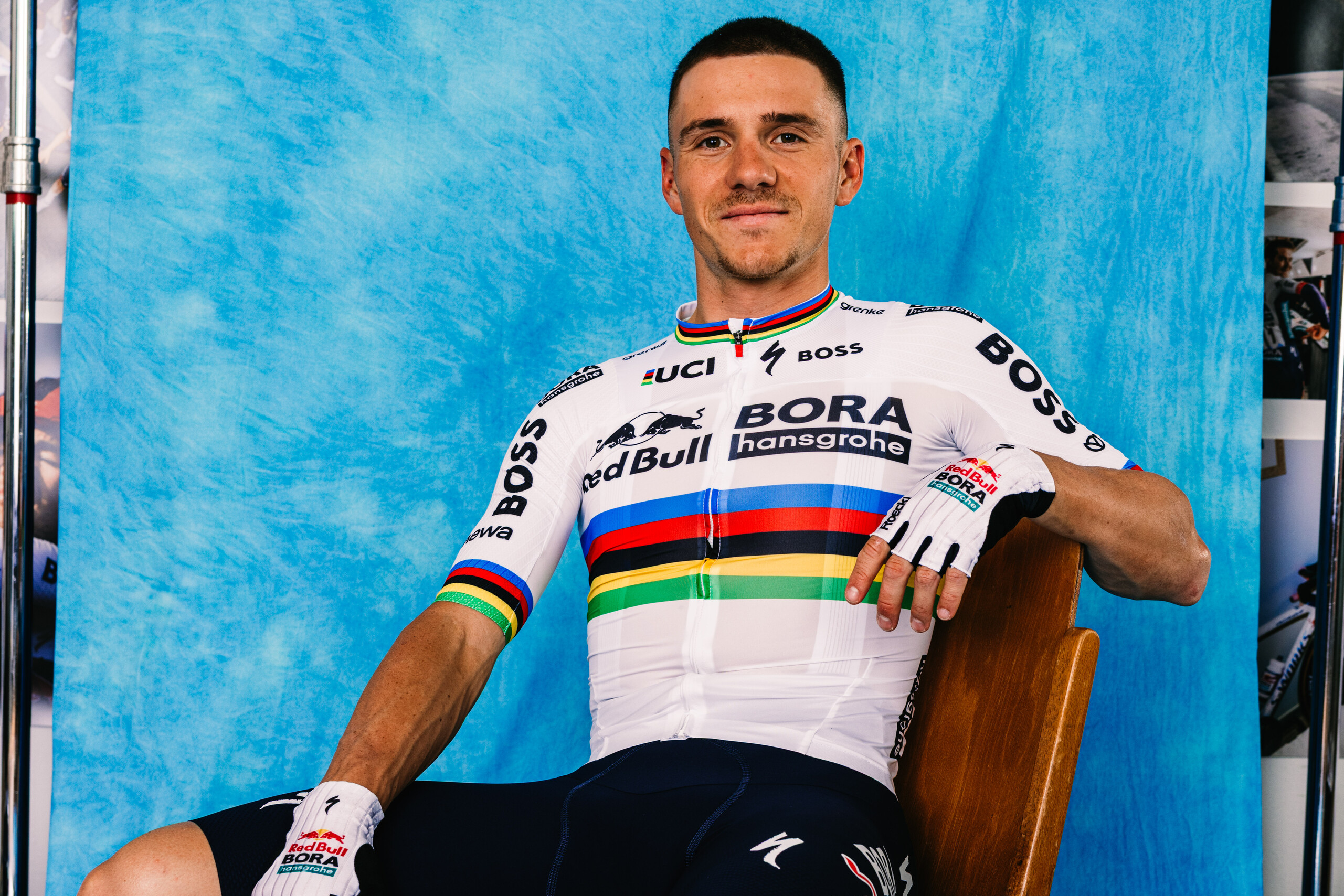Carmichael: Armstrong a 'long shot'
Armstrong's long-time coach talks about his Tour prep
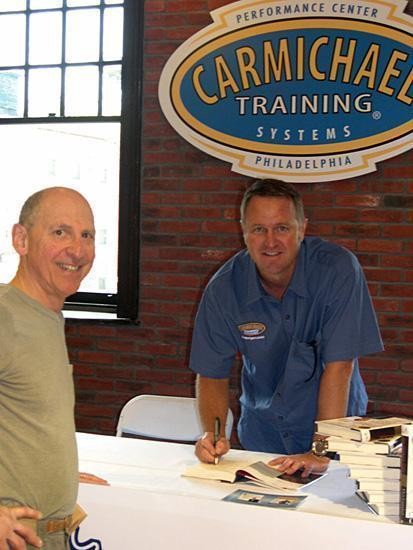
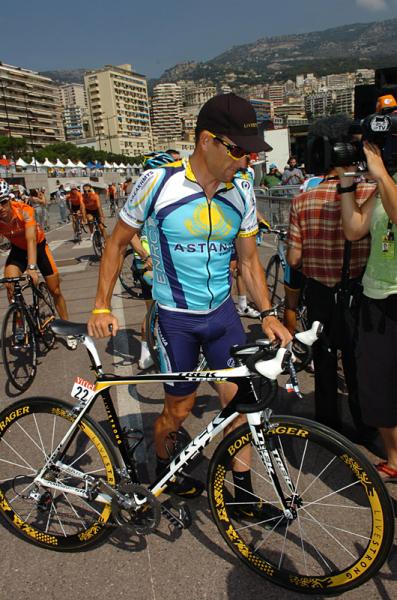
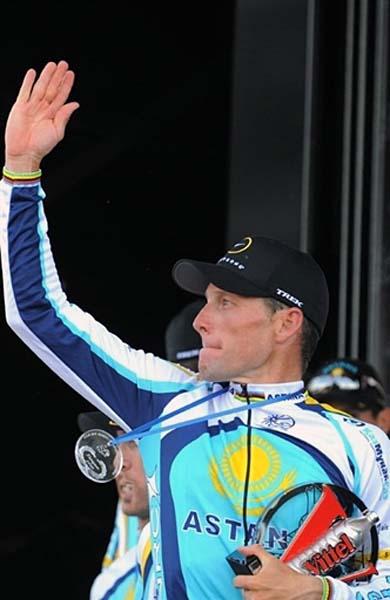
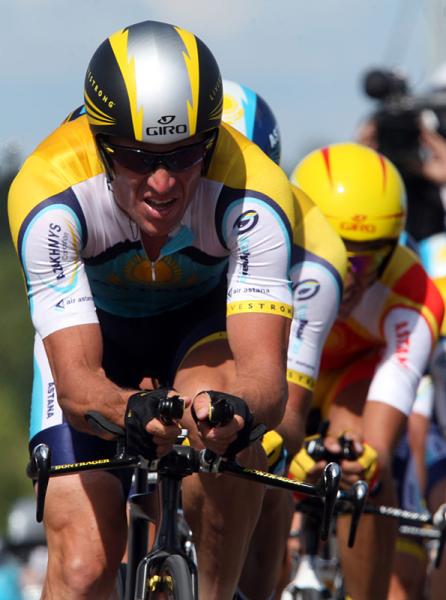
Cyclingnews: You and Lance Armstrong have always had meticulous planning culminating in peak fitness at the Tour de France for each of his seven victories. Where is Lance now, fitness-wise, when compared to the training data of previous Tours?
Chris Carmichael: It's a little different this time, it's not an apples to apples comparison from 1999 to 2005. The last eight to 10 weeks have been different than those previous years for several reasons. First was the broken collarbone. We then went to altitude at Aspen and trained there. That was an April like never before, we had never done that kind of thing before. And then the Tour of Italy, Lance had never done a Grand Tour before the Tour de France.
The most significant difference was the last four weeks before the Tour was all at 2,000 metres or higher training in Aspen. We had never really trained at altitude going into the Tour like that. The altitude makes it a little different to compare the data from what we were doing in Aspen to what we were doing in previous years.
When you're up at that altitude you lose about 10% of your power. That being said, the data from some of the last workouts that he did in Aspen was very encouraging and not that far off from what we've seen before in the past if you put in that 10% correction.
CN: Can you elaborate some more about the role of altitude training for Lance? Was there a specific reason for choosing Aspen as the location?
Carmichael: We did go to altitude a lot more this year than previous years. Lance had previously used hypoxic environments, such as tents, in his previous Tour de France preparations. He just didn't want to sleep in a tent any more.
In the past it was all about whatever was required in order to meet the goal, this time he's already won seven Tours so he wanted to make sure what he was doing he could fit in well with his family life with not living like a monk, so to speak.
The latest race content, interviews, features, reviews and expert buying guides, direct to your inbox!
In training for the Leadville 100 last year he spent most of that summer in Aspen, Colorado, which is close to Leadville. He was there with his family, fell in love with the town, built a house, so that was the number one reason to train in Aspen. He has his family and close friends around him, almost at all times, while he trains.
CN: Did the Giro have the desired effect, particularly the third week of a Grand Tour which you've spoken about as being a truly unique physiological process?
Carmichael: It really did exactly what we wanted it to do, and that was to get a big physiological adaptation. Physically in a Tour the first week to 10 days the rider will slowly weaken. If you're an athlete of Lance's capabilities you really look for an adaptation to occur in that third week. You look to see that athlete get stronger, meaning he's responding positively to the race and the workload.
We saw that adaptation in the third week, you could see it in the race results. In one of the hardest mountain stages he rode very well in support of Levi. If he was riding for himself he might have been even higher up. That was really encouraging. More importantly, what we looked for were those continued adaptations after the Giro was over. Lance has been getting stronger every week since the Giro.
CN: How does designing a program for Lance for the 2009 Tour rank in your challenges as a coach? It deviates from his classic Tour prep, plus there's been a three year gap away from professional level training/competition.
Carmichael: Although it was a different approach, the main thing we needed to do with Lance was get him into as many races and competitions as you could before the Tour. If you look at it, Lance kept getting stronger at all the training stress points along the way, which was really encouraging. The first one was the Astana team camp in December of 2008, then the Tour Down Under, the Tour of California and he went to Europe and was really progressing nicely.
I think the comeback was about 24 hours from looking really different in that Spanish stage race where he crashed. In that race the second stage was the time trial and all the training data we had on him up to that point showed he was progressing nicely.
We probably would have seen a pretty good time trial out of him and I think people would have said, 'Wow, this guy's really impressive.' In a lot of ways the broken collarbone really complicated it.
The challenge as a coach...when you work with Lance you're fortunate. He's a very special athlete and it's always a pleasure to work with him. There's never anything negative in working with Lance.
CN: How much contact/interaction do you have with Armstrong? Is this season different than previous years as his coach?
Carmichael: There's a lot more contact this year than previous years, mainly because it was starting from ground zero. It started a year ago, basically. Just as the Tour de France kicked off, the first week or so into it, he already said 'I'm thinking about coming back.'
He started training for Leadville. I live in Colorado Springs, he was in Aspen, and I spent a lot of time with him in July, August and September of last year in Aspen.
He wanted to make sure he had a strong support team around him this year, so there's been much more contact than those last few years when he was winding down into retirement. Also, Lance being in Aspen made it very easy and convenient for me and my family. I could be there in just 2.5 hours.
CN: Compare/contrast the Armstrong of 20 years ago to today. Have there been different psychological approaches over the years, issues with motivating to train or perhaps preventing overtraining?
Carmichael: I've worked with him for 20 years now and that's a long time to work with one athlete. I know him very well and he knows me. I think early in his career he was just unfocused. He was a very gifted athlete but he was unfocused a lot of the time.
When he was focused he'd get into great condition and win races like the world championships. In 1993 he won the world championships, finishing 18 seconds ahead of Miguel Indurain, at 21 years old. Think of some kid on the U23 team winning the elite world championships now, that's pretty hard to fathom.
CN: What do you think of the 2009 Tour route? Did any stages stand out for you and/or Lance for particular attention? Anything which would affect preparation?
Carmichael: The Tour changes every year but in many ways it always stays the same. The strongest guy always wins, that's for sure. You always go through the Alps or Pyrenees first then the Pyrenees of Alps second. Usually, the selection points occur later as the athletes tire. As you get through the first few mountain stages, the remaining mountain stages play a more decisive role. The time trials are always important, key stages.
This year is a little bit different. If you look at the opening time trial it's not a prologue, it's 15.5 kilometres and you've got to be sharp. You don't want to be coming out of that very first time trial 30 or 40 seconds down.
Then you look at the next to last stage which is typically a time trial and now you've got Mont Ventoux. That's perhaps one of the hardest climbs in France and having it at the end it's going to be an extremely important stage.
I think the way Lance has always approached it is that you have to be prepared to race any day of the Tour like it's the day it could win you the race. It could be the first stage, the eighth stage, or it could be the next to last stage. You don't know, but you've got to realize there are opportunities which present themselves out there and you've got to be able to seize them.
If you don't have the conditioning to seize those opportunities then they may not come back around. You've got to be in good shape throughout, you have to also realize it's a long race and that any expended energy on a particular stage is energy you may not have later on in the race. If you're going to expend a great deal of energy, you want to make sure you get the maximum benefit from that effort.
CN: As a member of 7-Eleven's 1986 Tour team you witnessed first hand the Bernard Hinault-Greg LeMond battle at the 1986 Tour de France. Do you think there's a potential for Astana to suffer a similar rift this year?
Carmichael: I don't think so. First of all, in 1986 that was just a nightmare any way you looked at it. But, I think the thing you've got to look at is Alberto Contador is the favourite. There's no way around that and then you have to look at who else is up there as a favourite. There's Carlos Sastre, who won last year and rode a strong Giro, there's Denis Menchov who won the Giro, there's Cadel Evans who's had strong Tour de France performances. There's Levi Leipheimer. Those guys are the favourites, Lance is the long shot.
It's important to remove the emotion from it and be intellectually honest with yourself. Lance hasn't won a major international race in four years. Yeah, he won Nevada City, but you can't say that's a major international stage race. So all of a sudden to put him in the ranks of a favourite would be you're looking at it emotionally.
He remains a long shot, but that being said he's also Lance Armstrong and nobody knows how to win that race better than Lance. Nobody's ever walked the face of the Earth who's been able to win that race better than Lance. He's in good shape and he's motivated, but he definitely doesn't fall in the favourite category.
CN: Do you think it's a mistake for Astana to not have chosen Chris Horner for the Tour?
Carmichael: I can't comment on that. Johan Bruyneel is the best guy in the business when it comes to those kind of decisions.
CN: There was a moment in Lance's first comeback in 1998 when he quit Paris-Nice and returned to the US, perhaps ready to leave the sport for good. You, Lance and Bob Roll famously went to Boone, NC which seemed to clear his mind, re-charge the batteries, and the rest is history so to speak. Have there been any similar inclinations from Lance during this comeback where he questioned his return to cycling?
Carmichael: He had a bad accident and was sitting in a gully in Spain. He never said it to me, but I know if I was him I'd probably be saying, 'Wait a second... I've got kids, I've won the race seven times. Remind me again why I'm doing this?' I don't know if that's the case. He's never seemed to waver in what I saw.
The main reason that he came back is for Livestrong. That was his main reason and has always been his reason. I think he's really enjoyed his comeback. It's been really refreshing for him. He's really likes being around his teammates, he likes the camaraderie of the whole peloton. He likes training, he likes being that fit, he likes the challenge. Lance has always been the guy when the odds are stacked up against him he likes it the best.
CN: Lance has had at last count 34 out-of-competition drug tests during his current comeback. Do you think he's being unfairly targeted?
Carmichael: I don't think he's being unfairly targeted. He's obviously a target. Is that unfair? I don't know. For him to do what he's doing at his age and after having been so long in retirement it kinds of answers some of the critics in my view. That former champs think that Lance was not playing by the rules, I think his comeback has really helped to answer those guys, to silence them, although I'm not sure anything will silence some of those people.
CN: Lance took a PR hit for not making the Don Catlin testing program come to fruition. Are there regrets not making that program work?
Carmichael: I don't know. To have 34 out-of-competition tests in basically six months of competition, that's a lot of testing. I don't think that anyone could have done any more. I don't think anyone will dispute that Lance is clean. If they do, they're not looking at it objectively.
After Le Tour
CN: What kind of training is planned for Lance post-Tour de France? How far in advance is his training program planned? Specific events post-Tour?
Carmichael: Lance is going to be doing the Leadville 100 and the Tour of Ireland. I haven't planned any training. I think Lance will ride on his conditioning from the Tour. He really wants to come back to Leadville and not finish second to Dave Wiens. He's perhaps the only guy using the Tour de France as his preparation for Leadville [laughs].
Will he race next year?
CN: Lance was sidelined by a broken collarbone, disrupting his training schedule this year. While one can't predict the future regarding accidents, physical ailments/injuries, is that motivation to try the Tour again in 2010, to perhaps achieve a more seamless prep for the Tour?
Carmichael: I haven't spoken one word to him about 2010 and he hasn't said one word to me about it. I don't know what his thoughts are. I know he's very focused on 2009. I think he wants to race next year, but we haven't talked about it.
Is he risking his legacy?
CN: Lance, of course, can only go down when considering where he'll end up on this year's Tour GC as compared to his legacy. Do you think Lance is risking tarnishing his achievements as an athlete with, say, an 8th place GC finish?
Carmichael: Initially when he said he wanted to come back my counsel was for him not to for the obvious reasons: most comebacks don't work, the last impression people will have of you, even if you're second, is that you've lost, all the standard cliches.
But with Lance, his seven [Tour] victories are solid. They're not going anywhere and nobody's done that. He knows what the potential downside is in the comeback from the beginning. He didn't make that decision without looking at all the pros and cons.
Who will be the next Lance?
CN: All of the US's Tour GC contenders are in their 30s. Who do you think of this country's younger talent can move into the GC vacuum which will likely occur in the next couple of years? Do you think it's important for the US to have a Tour contender to maintain the visibility of the sport?
Carmichael: You need a viable Tour contender, and not only a contender but someone who can win. Otherwise, the sport fades from general attention in the US. I think there are kids which are coming up but it's a long way out to say that they can win the race.
We've got some good young guys coming up on the Trek-Livestrong team, on the Garmin team, on the U23 team that the US has. Whether one is going to be a Tour winner is very early and premature to say.
I'm not as close to that as some of my coaches and some of the other people in the sport on that end of the spectrum, but look at Taylor Phinney. The last thing you want to do is put limitations on Taylor Phinney. I don't know how many people told me Lance was a great one-day racer but would never be a Grand Tour winner. That was a comment I think Marco Pantani made after Lance won his world championship in 1993.
A guy like Taylor Phinney, he seems to have more of an orientation for one-day events, but just look how young the kid is. Just close your eyes and fast forward until he's 24, there's no reason he couldn't be a potential Tour contender himself. Maybe, maybe not, but I wouldn't put a limitation on him.
Based in the southeastern United States, Peter produces race coverage for all disciplines, edits news and writes features. The New Jersey native has 30 years of road racing and cyclo-cross experience, starting in the early 1980s as a Junior in the days of toe clips and leather hairnets. Over the years he's had the good fortune to race throughout the United States and has competed in national championships for both road and 'cross in the Junior and Masters categories. The passion for cycling started young, as before he switched to the road Peter's mission in life was catching big air on his BMX bike.
